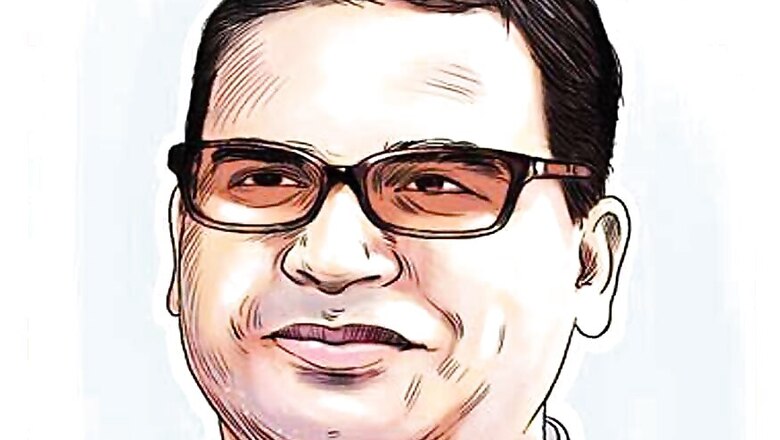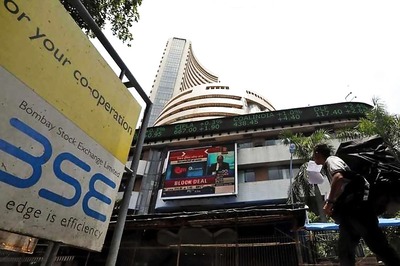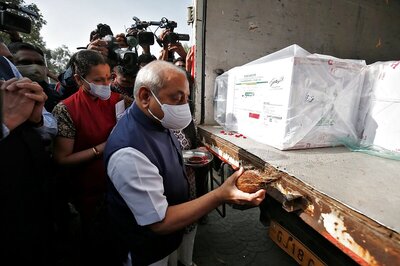
views
 David Axelrod, the man who scripted Barack Obama's presidential campaigns, once famously said that elections are like semifinals — they just give you the opportunity to make a difference. “But, at the end of the day, what really matters is what you did last night,” observed Axelrod.
David Axelrod, the man who scripted Barack Obama's presidential campaigns, once famously said that elections are like semifinals — they just give you the opportunity to make a difference. “But, at the end of the day, what really matters is what you did last night,” observed Axelrod.
The man considered as gold standard for election campaign managers was talking in the context of a key legislation Obama managed to slip through, but he might as well be speaking for his ilk in India where, like concurrent floods and droughts, pre-poll alliances and post-poll acrobatics go hand-in-hand.
When Nitish Kumar last month performed the somersault of the year by dumping alliance partner Lalu Yadav and joining hands with his main opposition BJP, the man who made him win the semifinals against all odds was taking a training session for leaders of YSR Congress.
In Hyderabad, Prashant Kishor drew the analogy of an architect while talking about mass campaigns: "A house is built as per the resources, the capacity and the desire of the owner. The architect's role is to make it better in design, give value addition, bring innovation and achieve the end-goals."
And then news came in that the Master of the House has bolted.
Well, the architect is yet to publicly betray his feelings, although he soon resigned from his role as advisor to the Bihar Chief Minister.
Kishor hasn't been to Patna for nearly a year anyway. Sources in Patna indicate Nitish Kumar and Kishor continue to share a personal bonhomie and his belongings left in the CM's official bungalow would remain there.
Like a hack in Patna opined wryly: "Who knows which side Nitish will be on next year!"
Meanwhile, Kishor — or PK as he is known — continues to be publicly taciturn about the developments, an art he perfected from the early days of 2013-2014 when he shepherded Narendra Modi's high-tech campaign.
He maintained his silence through the dramatic fallout with Camp BJP in 2014, his teaming up with Nitish to defeat BJP in 2015, his success with Congress in Punjab as well as the disastrous performance of his hand-crafted Akhilesh Yadav-Rahul Gandhi campaign in UP 2017.
While he enjoys the right to remain silent on his personal feelings and future plans, Kishor might have some explaining to do to the people of Bihar and Punjab.
His wildly successful campaigns in these two states buttressed his image as some sort of a Chanakya of poll campaigns, but his road to success is littered with broken promises.
Sample the 7 Nischays (resolves) he made Nitish promise the people of Bihar. The project required a total investment of over Rs 2.75 lakh crore — the annual budget of the state in 2016-17 was under Rs 1.60 lakh crore.
In Punjab, against what looked like a certain sweep by the AAP, Kishor came up with 'Captain ke 9 nukhte', promising among other things time-bound employment to least one person in each family in five years and Rs 2,500 allowance per month to the unemployed.
If the first 100 days of Captain Amarinder Singh government are any indication, the Nukhte has become the new Nishchay.
So just what is Prashant Kishor: A political mercenary who looks at democracy as an elaborate FMCG campaign and treats voters as consumers or does he have a long-term plan and an agenda for change as he once claimed?
Well, he definitely isn't a political change, says social scientist Manisha Priyam. “He knows political marketing and branding. He had marketed an old wine in a new bottle in Punjab because there was immense discontent and an immense desire for change. I would give credit to him for marketing a political brand but the pre-requisite for his success is that desire for change. AAP Delhi victory was without Kishor, UP elections victory of BJP was without Kishor,” she says.
Priyam notes that the desire for change among the "underclass" is at its strongest ever, putting politicians on a leash. “Delivering on the ground is important, that's what Nitish realised in Bihar after two years of governance with Lalu,” she says.
We reached out to Kishor for this story but he refused to talk. However, CNN-News18 spoke to several members of the leadership team of his Indian Political Action Committee (IPAC), who offered some insights.
"It is wrong to read PK's career as one aimed solely at getting back at BJP," one of Kishor's close associates says, adding that they zeroed in on Bihar because it looked like the real opportunity to prove IPAC was not a one-poll wonder.
“We were being told after PM Modi's campaign that we were just the right people at the right time. In mathematical theorem, if we reverse the setting and we ensure the skills can be tested and proved then we say 'Hence Proved'. Nitish Kumar was Modi's antithesis and if we were able to be the force multiplier in his victory then it proved we were on the right track in our political understanding of the state," he says.
So why Punjab? Well, again it is a case of pain of the parallels. The AAP made a name for their campaign skills after their sweep of Delhi Assembly polls, and it made sense to meet them head on in Punjab to see who is the best.
OK. So what explains the disaster in Uttar Pradesh where an Akhilesh Yadav, who appeared to be on a high just weeks before the polls, was reduced to a caricature after his alliance with Rahul Gandhi? Kishor had personally brokered the deal. The IPAC manager says his outfit accepted the UP challenge because it would have given them the opportunity to launch a Gandhi, which would have had national ramifications.
The Gandhi that is being talked about here is, of course, Priyanka, who, at the end of the day even refrained from campaigning, forget contesting. "It would have given us a chance to launch a Gandhi, which the Congress leadership had initially agreed to but backed out later," he says.
The IPAC ace who is quoted above refused to elaborate on his organisation's southern foray — they work with YSR Congress and are rumoured to be in talks with DMK — but sources inside lament it is like entering the boxing ring blind-folded.
"Language is a huge barrier and the politics of Godavari basin is different from that of Sabarmati, Kosi, Ganga and Sutlej," one of them said.
The BJP was in power in eight states in India when it came to power at the Centre in 2014. Today, it is in power in 18 states. Regional parties are fast becoming a footnote in the Indian electoral map and there are no signs on the horizon of a national alternative emerging for the powerhouse that is Amit Shah's BJP. As his former comrade Nitish Kumar himself said last week, it is Modi vs Nobody.
The space for the likes of Kishor is increasingly shrinking and probably the only legacy he can rightfully claim would be of seeding a mini industry of political strategising, with several IPAC offshoots in operation today from Kashmir to Kanyakumari.
Not everyone agrees that political consultants are being rendered irrelevant by the BJP wave. Sanjay Kumar, director of Centre for Study of Developing Societies, feels that pros like Kishor would be relevant so long as slogans play a part in polls.
"The political class is increasingly realising that all they need is a slight edge to win over the rivals, that the traditional style campaign is over and it's more professional-driven with technical and statistical tools. Big parties now have separate and formal wings to do this now," he says.
Kumar also discounts the criticism around Kishor's failure in Uttar Pradesh. "Failure and success are part of any profession. At the moment one failure will not affect his image, and it won't be a deterrent for parties, because of the aura he has built around him," he feels.
Political analyst Neerja Chowdhury observes that an "outsider" like Kishor comes in handy in that he can look at the electoral situation dispassionately and tell the leadership truths which a party person may not. However, while he has proved time and again that he can add value to any campaign that already exists on the ground, his craft cannot be a substitute for public support.
"In UP it wasn't there as they were fighting against a tide. Can his craft be a substitute for a ground level sentiment? No, It can only help, give additional momentum," Chowdhury says.
So will Kishor spring a surprise against all odds or will he quietly fade away lamenting that it is the politicians who failed him and not the people? Watch this space.
(More Sunday Features)




















Comments
0 comment